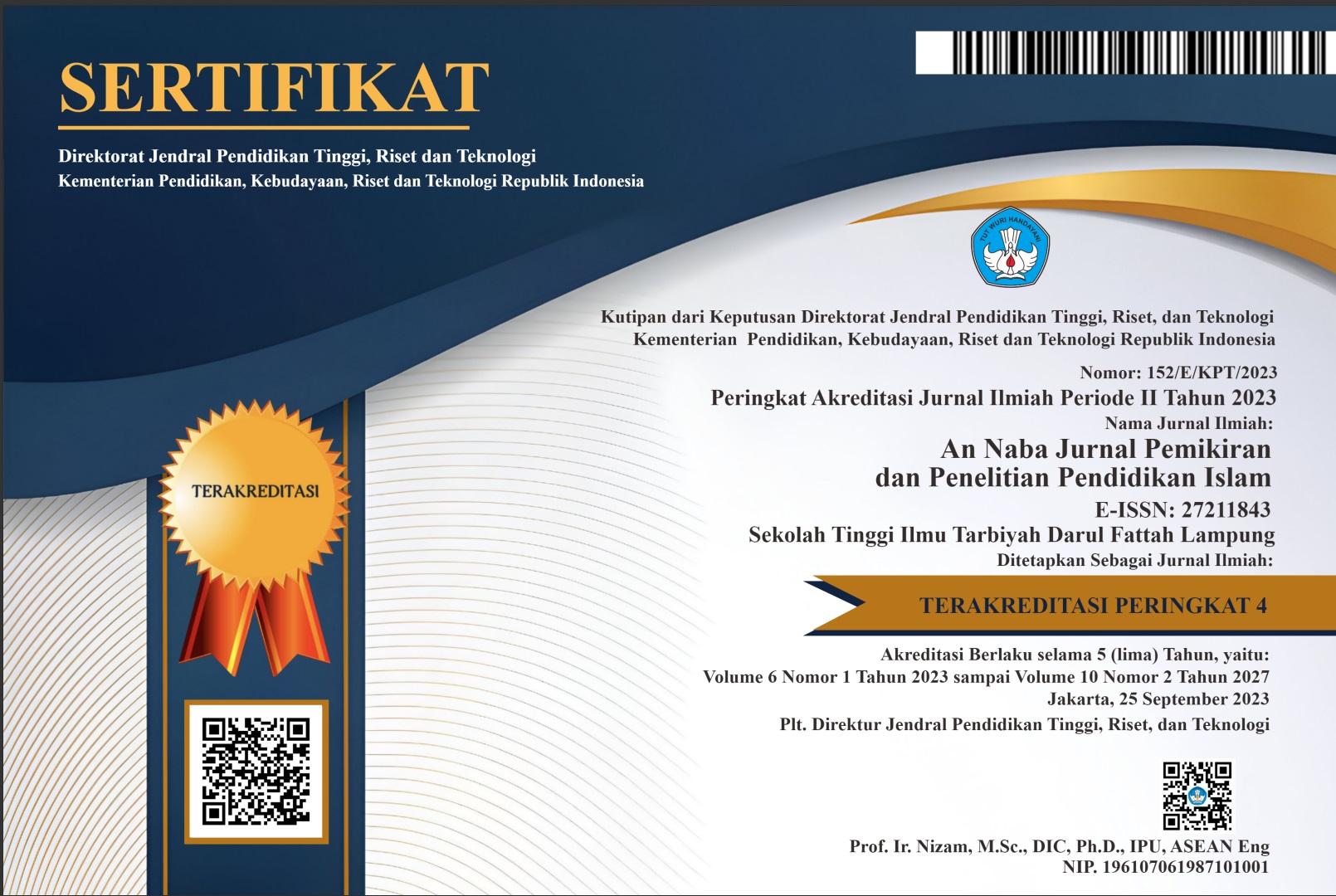Keberkahan Al-Quds Perspektif Al-Quran
Keberkahan al-Aqsha Perspektif al-Quran
DOI:
https://doi.org/10.51614/annaba.v4i1.76Keywords:
Blessing, al-Aqsa, al-QuranAbstract
For 15 centuries al-Quds was under the auspices of Islam al-hanif which was peaceful, prosperous and prosperous, full of blessings. Today the facts show that on the contrary, there has been a storm of humanitarian storms, full of conflict, oppression, the slaughter of millions of innocent people who died, the expulsion and seizure of the Palestinian property takes place almost every day without stopping due to the cruelty and savagery of the Zionist entity. Then where is the blessing of al-Quds? How did that tyranny continue to happen on the earth of the prophets? In order to respond to this humanitarian problem, the author tries to trace using the Research library study to reveal facts based on the approach of the letter al-Isra verse one which is correlated with similar verses and sociological-anthropological empirical data. The results of the study prove that the meaning of barakah is a gift of Allah absolutely without the involvement of creatures and the law of cause and effect (causality) from human efforts optimally. The conclusion of the study shows that the term barakah is divided into three aspects, namely: first, security from disturbance by evil humans, the wild star, as isra Rasulullah's journey from Mecca to Palestine. Second, the fertility of nature such as a variety of fruits, vegetables, livestock, grows. Third, peace, which is obtained through the serious efforts of the Muslim community as a legal provision of causality which causes peace. The factors of hard work and maximum smart work are the parameters of Allah's grace in overcoming conflicts and fighting for the liberation of al-Quds, so that blessings in the sense of peace on the earth of the martyrs can be realized.
References
Armstrong, Karen. Jerusalem Satu Kota Tiga Iman. Surabaya:Risalah Gusti, 2004, h. 303-308
Baqi, Muhammad Fuadi Abdul. al-Mu’jam al Mufaharas li al fadil Qur‟an al-Karim. Darul Hadist, 1996, h. 144-145.
Fatah, Abdul. Keberkaahan al-Aqsha Persepektif Hermeneutika Schleiermacher, Jurnal Peneleitian-ISSN, Vol. 14, No. 1 2017
Kauma, Fuad. Menelanjangi Yahud. Surabaya: Dunia Ilmu, 1998. h. 88-89
Kuncahyono, Trias. Jerusalem: Kesucian, Konflik, dan Pengadilan Akhir. Jakarta: Kompas. 2009. h. 130
Ma’luf, Louis. al Munjid fii Lughot wal „Alaam. Bairut: al-Maktabah al-Syarqiyah, 1989, h. 35
Madjid, Nurcholis. Perjalanan Religius Umrah dan Haji. Jakarta: Paramadina, 2000, h. 55.
Maleong, Lexy J. Metodologi Penelitian Kualitatif. Bandung: Remaja Rosda Karya. 1993. h. 2
Munawir, A.W. Kamus Al-munawir: arab-Indonesia terlengkap. Surabaya: Pustaka Progresif, 2002, h. 78
Shihab, M.Qurais. 2009. Tafsir Al-Misbah: Pesan Kesan dan Keserasian al-Qur`an. Jakarta: Lentera Hati, h. 193-195
Sholehuddin, L, Eksistensi al-Quds Perspektif Historis-Religious, An Naba: Jurnal Pemikiran Dan Penelitian Pendidikan Islam Volume 3, Nomor 2, Tahun 2020 p-ISSN 2087-4642 e-ISSN 2721-1843
Zuhaili, Wahbah. Tafsi al-Munir, Fi al-Aqidah wa al-syar‟iah wa al-manhaj. Bairut: Darul Fikri, Tt. h.13-14.
Putu, I Windu Mertha Sujanaa, Cecep Darmawan, Dasim Budimansyahc, Sukadid, Representasi Pendidikan Kewarganegaraan pada Jenjang Pendidikan Tinggi Dilihat dari Perspektif Generasi Millenial, Jurnal Inspirasi Pendidikan Vol. 10 No. 2 Tahun 2020 | Hal. 125 – 132














.png)




